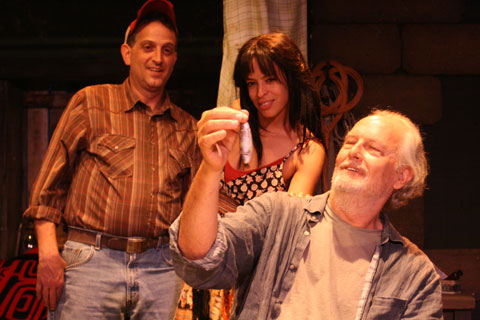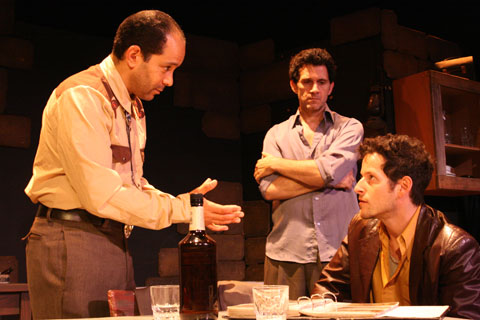The Late Henry Moss: Sam Shepard’s final exorcism
By Richard Adams
7 July 2012
Directed by David Fofi, produced by Ronnie Marmo at Theatre 68 in Los Angeles, June 30-July 28, 2012.
 The Late Henry Moss Joe Dalo, Ivet Corvea and Gary Werntz [Photos: Mathew Richter]
The Late Henry Moss Joe Dalo, Ivet Corvea and Gary Werntz [Photos: Mathew Richter]The plays of Sam Shepard have been justly praised for exploring the demons that prowl the dusty outlands of the American psyche. Many of his best-known characters are outlaws and outliers, desert-rats and misanthropic loners, gun-fighters and rock stars.
Shepard (born 1943) shows us the dark side of that much-celebrated American “virtue”—rugged individualism. His plays touch a raw nerve in American culture that seems ever-primed to explode—and often does—into violence. To create drama he plunges these characters into circumstances of confusion, contradiction and duress. Many of his plays are the poetic equivalent of a cage fight. But he’s at his best when zeroing in on families shattered by violence, abandonment, substance abuse (usually alcohol), poverty and dislocation.
Of all those plays that wrestle with families, four stand out: Curse of the Starving Class, Buried Child, Lie of the Mind and True West. The Late Henry Moss, being given, at least in my estimation, a definitive production at the small Theatre 68 in Los Angeles, directed by David Fofi, is a culmination of the themes that dominate the others.
The cast is extraordinary without a weak link in the ensemble. Many of these actors whose work I’ve seen elsewhere deliver powerful performances that capture the wild poetry of Shepard’s language, the extreme behavior and near-delusional obsessions of their characters, yet keep these people grounded in an often bleak concrete reality. The work is raw, explosive, yet still perfectly shaped, a tribute to both these actors and their director.
 The Late Henry Moss Mark Adair-Rios, Ronnie Marmo and Michael Blum [Photos: Mathew Richter]
The Late Henry Moss Mark Adair-Rios, Ronnie Marmo and Michael Blum [Photos: Mathew Richter]The play, set in an adobe shack somewhere in the New Mexico outback, is a strange hybrid of “murder mystery” and sitting shiva. Alcoholic desert-rat Henry Moss has been found dead in his little adobe by his estranged eldest son, Earl (Ronnie Marmo). Earl’s been summoned to New Mexico by Henry’s concerned neighbor, Estaban (Mark Adair Rios). Earl hasn’t seen his father for decades; he fled after witnessing his father bludgeon Earl’s mother. Ever since, Earl has been haunted by the fact that he was too frightened to intervene. His younger brother Ray (Michael Blum) has blamed his brother for abandoning him and his mother. Ray now wants to know exactly how his father spent his last days, with whom, and what his brother did when he arrived.
There’s a sense, never articulated, that Ray suspects that Earl was somehow implicated in their father’s death. Ray interrogates the Taxi Driver (Joe Dalo, offering a stellar comic portrait of a man literally quaking in his skin) who took Henry and his Mestizo girlfriend Conchalla Lupina (Ivet Corvea) on a fishing trip the day before Henry died. Ray grills Esteban, the reformed alcoholic and Henry’s only friend, who lives in the trailer across the way from Henry’s adobe and brought the old man soup almost every day. The events of that day are revealed in flashback scenes that leap seamlessly from Ray’s interrogations.
As in almost all of Shepard’s work, Henry Moss grapples with the blurry lines between fact and fiction, life events and tall-tales, history and mythologizing. The emotional power of these plays depends on the degree to which we’re made to share in the investment these characters make in believing in and holding onto their versions of the “truth.” Facts are constantly in dispute, and even when different versions of events are shown to be implausible, these people hold onto their own versions with a desperation that suggests that without those stories their self-identities would crumble.
To succeed as drama, audiences must root for each of these characters’ beliefs to be true, even though we know they all can’t be. We’re confronted with the notion that reality appears to those involved to be a personal construct, all the while that we’re reminded that such subjectivism is a dead end. With individuals at loggerheads, stalemated conflicts can only be resolved by complete submission to another or resolved though violence.
With The Late Henry Moss, Shepard exhumes the fathers of his plays past, Weston from Starving Class, Dodge from Buried Child and the unseen father of True West. It’s easy to see Ray Moss as the trapped teenager Wesley from Starving Class and, in some ways, as the prodigal son Vince in Buried Child. It’s even easier to see Earl and Ray Moss as variations on the embattled brothers of True West. And the long-ago spousal abuse that suppurates at the core of Lie of the Mind often feels like back-story to Henry’s battering of Ray and Earl’s mother.
Many, including Shepard himself, have noted that the brothers in these plays are two aspects of a single son, split for dramatic purposes and to avoid what would otherwise become an internalized psychological conflict. This composite “son” is forced to confront the legacy of the patriarch and forced to choose between the legacies of mother and father. The elder brother in these plays tends toward imitation of the father, the younger toward the mother. But, in all of these plays, whenever the younger brother fights back, he becomes more and more like his older, more violently inclined sibling.
Shepard, notoriously cryptic about discussing his own work, has occasionally been a bit more forthcoming on the subject of fathers and sons, acknowledging that he has drawn on his own life experiences for these plays. In 1996, Shepard described his own response to his father’s death in “See You In My Dreams,” a story from his collection Cruising Paradise. Story details include many of the same elements we see in The Late Henry Moss, including the characters of Esteban and Conchalla, as well as the peculiar fishing trip that Henry took the day he died. Shepard’s confessional short story and his other “family” plays all culminate in Henry Moss.
While many critics have faulted this play and the playwright for re-tilling old thematic ground and have criticized the play for its apparent over-expository first act, asserting that it belabors the obvious, it takes a special talent to find and maintain the intensity that turns these repetitions into escalating confrontation. In this production, brilliantly directed by Fofi, that intensity never flags. The mysteries continue to ripen until they burst, and the raw need to escape one’s past by finally confronting it is fully embraced.
The actors are unnervingly brave in their choices, never succumbing to the temptation to be “liked.” Gary Werntz as Henry is a roaring domineering giant of a man whose demons have completely possessed him. It’s a galvanizing performance. As Esteban, the Taxi Driver and Conchalla, in roles that, in lesser hands, can (and often have) devolved into ethnic stereotypes and clichés, Rios, Dalo and Corvea excel. (To see what can happen when a “star” cast is let loose on this material, check out the documentary This So-called Disaster, about rehearsals of the play with Shepard directing.) As the Moss brothers, Marmo and Blum bring all the super-saturated colors of character that make them richly complex and distinct human beings, not mere vehicles for the playwright’s psychological battles.
While the many demons that roam through this play are never fully tamed or exorcised, at least Ray finally comes to an uneasy truce with them. As in so many of Shepard’s best plays, food is the ultimate symbol of a tentative civility and peace—when the fridge is empty, the hungry ghosts prowl; when it’s full (or when Ray restocks the fridge in the final moments of Henry Moss), the possibility of peace settles on these troubled hearths.





Follow the WSWS